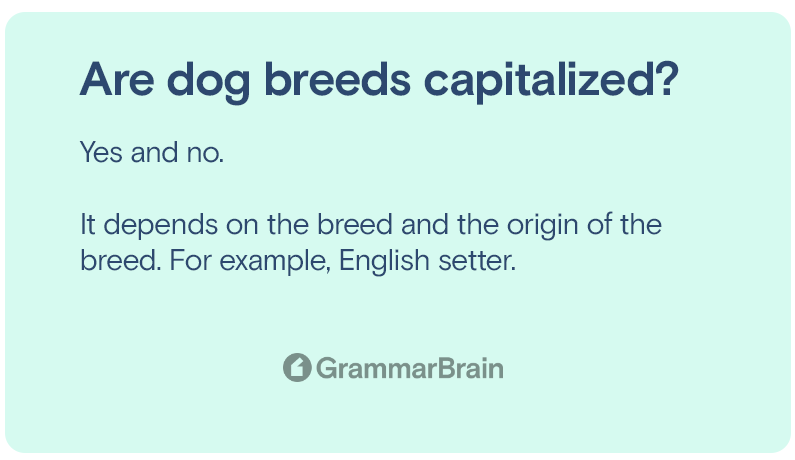When referring to a dog breed, do we capitalize the name of the breed? This is a great question that alludes to common capitalization rules. Learn whether or not a dog breed name should get capitalized in this short guide.
Are dog breeds capitalized?
Should you always capitalize dog breed names? Do you only do it with a few select breed names? A lot of confusion exists regarding this among most people.
Unfortunately, there are no defined rules of capitalization for dog breed names.
The rules vary depending on location, clubs, etc. It is essential to examine when these differences occur.

Capitalization rules as per the American Kennel Club (AKC)
The American Kennel Club is a giant among all the top dog registration clubs in the US. They recommend that every dog breed name should be capitalized. They even capitalize the term ‘dog’ at the end of each breed name. This practice helps them to clarify exactly which breed name they are discussing.
Dog breed name representation is highly valued by them. So, they make sure to establish every breed name as clearly as possible. They even develop dog breed standards. Capitalization of every dog breed name is a great way to achieve this goal.
Capitalization rules as per Merriam-Webster’s
As a popular publishing company, they state that only proper nouns should be capitalized and common nouns should not. For example, in the breed name – ‘English mastiff’, the first word ‘English’ is a proper noun and is in capital form.
However, the second term, ‘mastiff’ is a common noun without capitalization.
As per this standard, every dog breed name must begin with a capital letter.
However, there is an exception to this rule as not every dog breed has a specific country of origin.
For example, in the breed name – ‘basset hound,’ the first word is not a proper noun meaning ‘low’. So, there is no capitalization.
Merriam-Webster is mainly concerned with correct grammar, syntax, and word conjecture. Representing dog breed names is not a priority to them, so they follow the usual or standard capitalization rules of the English language.
This is also known as the AP style (Associated Press Stylebook). This is why you see some writers only capitalize specific dog breed names.
Knowing your target audience
As there is no mutually agreed ruling concerning the capitalization of dog breed names, you can choose which way you want to go based on your target audience. This will be the most practical approach if you are a writer.
For example, if you are writing to dog lovers, it is a better idea to capitalize all the words to show importance. While writing to a publication, asking them about the matter is a better idea.
If you represent a publication, keeping the capitalization rules consistent is a top priority.
So, you can go ahead with any of the aforementioned rules and stick to them.
Importance of research
To follow the standard capitalization rules based on noun type, researching the breed’s country of origin is vital. In some cases, the breed name might not begin with a noun in the first place.
This is because not all countries follow standard naming guidelines.
Conclusion
In a nutshell, capitalization is not necessary for everyday use when referring to broad categories of dogs.
However, if you can identify a dog breed name associated with a particular country, region, or people – capitalizing the name would be the way to go!
By following these guidelines, you will seldom have trouble deciding whether to capitalize a dog breed name or not.
Inside this article
Fact checked:
Content is rigorously reviewed by a team of qualified and experienced fact checkers. Fact checkers review articles for factual accuracy, relevance, and timeliness. Learn more.
Core lessons
Glossary
- Abstract Noun
- Accusative Case
- Anecdote
- Antonym
- Active Sentence
- Adverb
- Adjective
- Allegory
- Alliteration
- Adjective Clause
- Adjective Phrase
- Ampersand
- Anastrophe
- Adverbial Clause
- Appositive Phrase
- Clause
- Compound Adjective
- Complex Sentence
- Compound Words
- Compound Predicate
- Common Noun
- Comparative Adjective
- Comparative and Superlative
- Compound Noun
- Compound Subject
- Compound Sentence
- Copular Verb
- Collective Noun
- Colloquialism
- Conciseness
- Consonance
- Conditional
- Concrete Noun
- Conjunction
- Conjugation
- Conditional Sentence
- Comma Splice
- Correlative Conjunction
- Coordinating Conjunction
- Coordinate Adjective
- Cumulative Adjective
- Dative Case
- Determiner
- Declarative Sentence
- Declarative Statement
- Direct Object Pronoun
- Direct Object
- Diction
- Diphthong
- Dangling Modifier
- Demonstrative Pronoun
- Demonstrative Adjective
- Direct Characterization
- Definite Article
- Doublespeak
- False Dilemma Fallacy
- Future Perfect Progressive
- Future Simple
- Future Perfect Continuous
- Future Perfect
- First Conditional
- Irregular Adjective
- Irregular Verb
- Imperative Sentence
- Indefinite Article
- Intransitive Verb
- Introductory Phrase
- Indefinite Pronoun
- Indirect Characterization
- Interrogative Sentence
- Intensive Pronoun
- Inanimate Object
- Indefinite Tense
- Infinitive Phrase
- Interjection
- Intensifier
- Infinitive
- Indicative Mood
- Participle
- Parallelism
- Prepositional Phrase
- Past Simple Tense
- Past Continuous Tense
- Past Perfect Tense
- Past Progressive Tense
- Present Simple Tense
- Present Perfect Tense
- Personal Pronoun
- Personification
- Persuasive Writing
- Parallel Structure
- Phrasal Verb
- Predicate Adjective
- Predicate Nominative
- Phonetic Language
- Plural Noun
- Punctuation
- Punctuation Marks
- Preposition
- Preposition of Place
- Parts of Speech
- Possessive Adjective
- Possessive Determiner
- Possessive Case
- Possessive Noun
- Proper Adjective
- Proper Noun
- Present Participle
- Prefix
- Predicate



